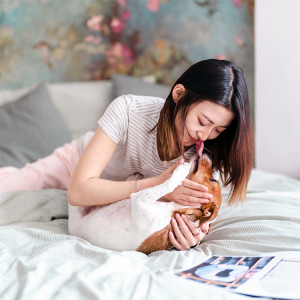Why Does My Dog Keep Licking Their Butt?
Learn about the causes of this behavior and if you should take action.
In This Article:
Is It Normal For Dogs to Lick Their Butt? What Causes Dogs to Lick Their Butt? What If Your Dog Is Excessively Licking Their Butt? What to Do About Excessive Licking
We’ve all been there: While enjoying a gathering at your home, your dog comes in, plops down in the middle of your guests’ conversation and starts licking their butt. Is it that they know just how to embarrass you or is a dog licking their butt due to something else?
Well, your dog probably doesn’t hold a secret grudge against you so their butt-licking behavior is likely due to normal hygiene or it could stem from a health issue. Let’s talk about it.
Is it normal for dogs to lick their butt?
No dog is above licking their butt, no matter how much you want to believe that your pooch wouldn’t ever do something so disgusting. It’s a normal habit that most of us have learned to live with as part of being a dog parent, and you’re bound to run across the occasional butt-licking session.
How much do you spend on your pet per year?
What’s not OK is when your dog makes a habit out of licking their butt, or if you’re starting to notice some irritation or other signs along with it.
What causes dogs to lick their butt?
Mainly, licking their butt is your dog’s way of keeping themselves clean, though it may seem counterintuitive from a hygiene standpoint. However, anything pertaining to the anus and genital area could be a potential cause for butt-licking, including the following:
Anal gland issues: A dog’s anal glands are located just inside the rectum and are responsible for producing a thick, stinky liquid that makes each dog’s unique mark on their feces. Sometimes, those anal glands can become clogged, infected, or even cancerous. When the anal glands are irritated, it causes a pup a lot of discomfort, something they try to relieve by scooting their butt on the floor and lots of licking.
Parasites: Dogs can play host to a number of internal and external parasites. Whether it’s worms in the intestines or fleas on the skin, parasites are nothing if not irritating. Tapeworm segments exit the anus, where they seek refuge in a dog’s hair or in the environment, which may cause a dog to lick. Fleas like to harbor in the hairs at the base of the tail, which is also a reason to lick.
Allergies: Environmental and food allergies can cause dogs to itch and lick themselves all over. Many dogs with allergies lick their feet, but that licking can extend anywhere, even their butt. Look for red, irritated, and/or itchy skin and hair loss as other potential signs.
Infections: Urinary tract infections (UTIs) or a nasty diarrheal bug can leave a dog’s butt and genital area sore and irritated, prime reasons for a dog to spend their time licking it. Other signs of infections include frequent urination, bloody urine, diarrhea, vomiting, and not eating.
Cancer and more: Cancer can cause tumors anywhere in a dog’s body, including the rectum, anus, and anal glands. When tumors start to invade these spaces, it can create a lot of discomfort which a dog may try to soothe with licking.
Also on this list are perianal fistulas, polyps, strictures, tears, and hernias which can cause a lump, bump, or hole around your dog’s anus, just giving them another reason to lick their butt.
What if your dog is excessively licking their butt?
A little licking is to be expected, so don’t fault your dog when they pay a little extra attention to that region. But if your dog would rather lick their butt than play ball, go for a walk, or eat dinner, then you’ll need to look into things.
What does it mean?
If you notice that their butt-licking is becoming more frequent or more intense, take a look to see if you notice anything out of the ordinary. Extra or excessive butt licking could indicate something is irritating or causing discomfort or pain in a dog’s anus, rectum, anal glands, or genitals. Sometimes, butt-licking can even be a sign of a digestive issue or allergies.
What to do about excessive licking
If your dog is starting to devote more and more time to licking their butt, it’s time to get to the bottom of it, so to speak. Start by checking your pup out. I know it might not be the most desirable job, but getting a good look at things can really go a long way.
If you can, enlist the help of someone else to hold your dog as this may be a little uncomfortable for them as well. Gently lift the tail, and look for any sores, lumps, or irritation around and under the tail. Monitor them for other signs, such as diarrhea, frequent urination, itchiness, or scooting, and these will further clue you in.
When to consult a vet
Whether you find something or not on your initial exam, it’s best to get your vet involved. Most causes of a dog licking their butt can’t be treated at home, even if you find the cause, but the more information you can gather for your vet, the better.
Your vet will start with an external examination of the genital and anus. They may then perform a digital exam to check the anal glands and for any lumps inside the rectum. Further bloodwork or imaging may be needed depending on the route the initial exam takes. A urinalysis and fecal will likely be in order as well.
Treatment of excessive licking
Once your vet gets to the root of the problem, they can begin treatment. For some dogs this may mean expressing the anal glands or treating an anal gland infection. Other dogs may need antibiotics for a UTI, supportive care for a digestive issue, antihistamines, anti-inflammatories, or a diet change for allergies, or parasiticides for worms or fleas. Some types of cancer, polyps, or fistulas may require surgery plus additional therapies.
References
Rubin, Stanley I., DVM, MS, DACVIM. “Disorders of the Rectum and Anus in Dogs.” Merck Veterinary Manual. Sep 2024. https://www.merckvetmanual.com/dog-owners/digestive-disorders-of-dogs/disorders-of-the-rectum-and-anus-in-dogsopens in new tab.











